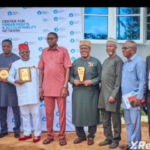As the Federal Government launched the newly developed transgenic maize variety Tela, the Federal Ministry of Health and Social Welfare and the All Farmers Association of Nigeria (AFAN) highlighted some of the maize’s benefits, with the Health Ministry affirming the crop’s safety.
Nigerian scientists at the Institute of Agricultural Research (IAR), Zaria, developed the new Tela maize in partnership with the African Agriculture Technology Foundation (AATF), the Bill and Melinda Gates Foundation, and other partners.
The Minister of Health and Social Welfare, Dr. Mohammed Ali Pate, speaking through a representative at the official launch of the Tela Maize, expressed delight that Nigeria is gaining ground among the comity of nations using modern biotechnology to address critical agricultural challenges.
The Minister explained that the “TELA Maize Project is one of several interventions by AATF on the African continent to address the problems of drought and destructive insects.
The Federal Ministry of Health and Social Welfare is excited to be part of the launch of the TELA maize, which, in addition to being developed to resist the highly destructive Fall Army Worm (FAW) pest, previously controlled by harmful chemicals, can produce a yield of up to 9 MT per hectare.”
Pate said his ministry’s mandate involves formulating, implementing, and supporting policies and programs related to good health.
He stated that when it comes to genetically modified crops, the ministry is guided by the activities of the National Biosafety Management Agency (NBMA), an agency under the Federal Ministry of Environment responsible for ensuring the proper regulation of modern biotechnology and its products so they do not cause harm to human health or the environment.
The Minister further explained that before approving GMOs for use in Nigeria, the NBMA conducts rigorous risk assessments to ensure they are safe and healthy.
“At several forums, the NBMA has stated that GMOs are safe for humans and the environment and can help Nigeria achieve food security. We strongly share this belief and are ready to support any product, program, or initiative that promotes good health.
“A major pest attack in Africa is the FAW, capable of causing 100% yield loss in maize, thus jeopardizing food security throughout Africa. The FAW, a transboundary and invasive moth from the Americas, was first detected on the African continent in Nigeria in early 2016 and had invaded and spread throughout sub-Saharan Africa by 2018.
“Presently, the FAW invasion has become the biggest threat to maize production and the maize value chain in Africa.
This pest has been a nightmare for many smallholder farmers in Africa, including Nigeria, who have resorted to several control measures for FAW, including the use of chemical pesticides, which are expensive and harmful, hand-picking the pest’s egg masses and larvae, which is ineffective, and other cultural practices that are time-consuming and not sustainable.
ALSO READ: Akwa Ibom group commends Tinubu, Eno, others for good governance
“Therefore, today marks a significant milestone in our collective efforts to address this menace as we offer our farmers varieties that are affordable and effective in resisting the attack by the FAW.
“While climate change has favored the proliferation of destructive pests, reducing our food production over the years, population growth in Africa has significantly increased the amount of food needed to adequately feed our people.
“With the success story of the PBR cowpea, agricultural biotechnology has proven to be a lasting solution to enhance food security and mitigate the impacts of climate change in Africa. I therefore urge all Nigerians to accept this safe technology,” he added.
On his part, the President of the All Farmers Association of Nigeria (AFAN), Arc Kabir Ibrahim, said farmers are losing a lot of maize in the field due to pest attacks and drought.
“I understand that the maize has a 3-in-1 advantage and we cherish that. Farmers have been losing a lot of money fighting insects like stem borers, fall armyworm, and drought.
“Maize is very unique in our food system because both livestock and humans consume maize. The quantity of maize we have in Nigeria is not enough. There is no better time than now for us to optimize the production of maize because we need food security in Nigeria.
“I challenge the farmers to embrace Tela maize. It is safe for consumption. Plant them so that the world will be food secure,” Ibrahim noted.
WATCH TOP VIDEOS FROM NIGERIAN TRIBUNE TV
- Let’s Talk About SELF-AWARENESS
- Is Your Confidence Mistaken for Pride? Let’s talk about it
- Is Etiquette About Perfection…Or Just Not Being Rude?
- Top Psychologist Reveal 3 Signs You’re Struggling With Imposter Syndrome
- Do You Pick Up Work-Related Calls at Midnight or Never? Let’s Talk About Boundaries






